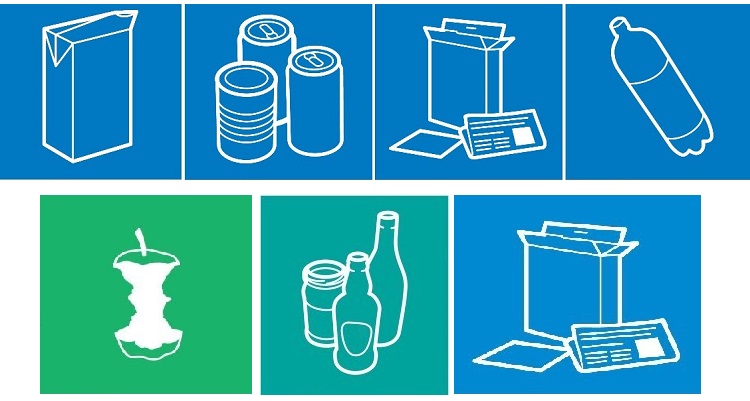Reduce, reuse, recycle
Reduce and reuse
Different sustainability initiatives in the town aim to minimise waste and consumption by encouraging the use of second-hand and shared products. Please see the circular economy page for more information.
Recycling
Recycling is an important aspect of our environmental goals. You can help us to reduce our waste and ensure that recycling bins are not contaminated by following the recycling signs and recycling properly within University buildings and at home.
The recycling systems used within and outwith the centre of town are different, so when recycling at home, it's important that you follow the guidelines for your specific postcode.
You can find the bin information and collection dates for your home using the Fife Council’s Bin Calendar and more information about how to recycle items that aren’t listed there on their A to Z of recycling.
Single bin recycling system
If you live within the centre of town, Fife Council provides limited resources for recycling. For general waste, you will have a bin or seagull-proof refuse sack assigned to your house. To recycle you have to take your recycling to one of Fife Council's recycling points.
Four bin recycling system
If you live outside of the centre of town, your household will have the following four bins: blue, green, grey, and brown. For details on what should and should not go into these bins, please refer to Fife Council's household recycling web page.
University recycling sites
- Students Union (KY16 9UA)
- Main University Library (KY16 9TR)
- Outside all student halls or residences
Follow these guidelines to recycle effectively at the University and in the town:

Top (left to right): cartons, food and drink cans, paper and cardboard, plastic bottles
Bottom (left to right): mixed glass, food waste, paper and card
Recycling at St Andrews
Have you ever gone to throw something away and suddenly realised you’re not sure which bin you should use? Use our FAQs below to help you choose the best bin for your rubbish. If you have further questions, please email the Environment Team on environment@st-andrews.ac.uk.
Frequently asked questions about what and how to recycling at the University of St Andrews
| Question | Answer |
|---|---|
|
Do I have to wash plastic items, such as plastic bottles and yogurt pots, before putting them in the plastic recycling bin? |
No – these can be placed directly into recycling bins. Us the plastic or Dry mixed Recycling (DMR) bins. |
|
Can I recycle a disposable coffee cup like those from Costa? What about the coffee cup lids? |
Yes – these should be placed into plastic or DMR |
|
Do I need to take the lids off plastic bottles? |
No – these can be left on |
|
Why are there no glass recycling bins at the University? |
There are no internal glass recycling bins to ensure the safety of cleaning staff when emptying. There are several external mixed glass bins located across the University campus. |
|
Where can we recycle electronics? |
A request can be made to the Recycling Team in Estates to collect electronic items which are then reused, recycled or repurposed. |
|
Where do I put energy bar packets and crisp packets – are they plastic or paper? |
These should be placed into plastics or DMR |
|
Where does compostable cutlery and other ware go? |
Compostable items should be placed into the Vegware compostable packaging bins located at the three University cafés. University catering services will take away and package Vegware items from catered events for composting at the Vegware plant near to Aberdeen. |
|
Is it better to leave the lid on my milk bottle before recycling it or take it off? |
Leave it on |
|
Can I put all kinds of plastic in plastic recycling, including film? |
Yes, including film. Plastics are separated at the mixed recycling facility prior to recycling. |
|
What do I do with tea bag sleeves and wrappers – some look and feel quite paper-ish, while others seem coated with a waterproof-like layer? |
Into DMR, which is for plastics, cans, cartons, paper, cardboard, and other materials that all get sorted at the recycling plant. Paper and cardboard are actually also being dealt with through DMR processors, so whether the tea bag wrapper has a slighty glossy feel or is purely paper, it can go into the same bin. |
British Heart Foundation
The University works with the British Heart Foundation (BHF) to provide donation banks around campus, which can be found near the Halls of Residence.
Donations are sold in BHF's East Fife shops and the money collected is returned to the University in the form of research grants for studying heart conditions.
Tool Share
The Tool Share service, run by the Transitions team, allows people to borrow tools, including garden equipment, power tools and kitchen appliances, instead of having to buy new products. It is open to anyone at a membership cost of £15 per year.